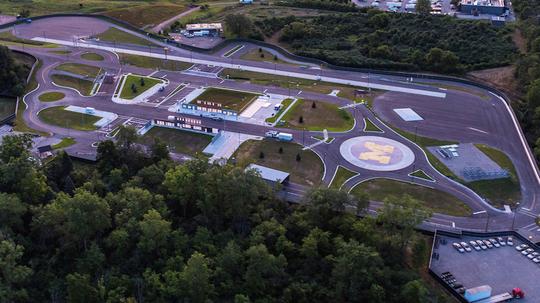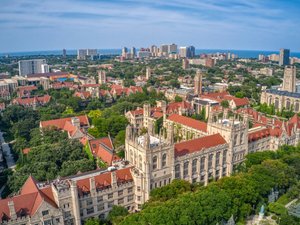
This story is part of our Inno on the Road series, where we take a look at innovation hubs throughout the Midwest. Check back all week for more coverage on Ann Arbor's tech and startup scene.
Detroit, Mich., was established as the “motor city” back at the turn of the 20th century, when Henry Ford founded the first U.S. car manufacturer, Ford Motor Company. Now, Detroit is home to not only Ford, but General Motors and Chrysler, the three major American car manufacturers that have helped establish Detroit as the nation’s home of automobile innovation.
But just 30 minutes away in Ann Arbor, a new organization is taking that innovation to new heights as the world gears up for the regular use of automated and autonomous vehicles.
Mcity, a University of Michigan-affiliated research facility, features 32 acres of urban-like streets, highways and traffic signals, where automakers and researchers can study and test their automated and fully autonomous vehicles in a real-world setting.
The site, which opened in 2015, helps inform car manufacturers and researchers on how well their vehicles are interacting with other cars and pedestrians. On average, more than 40 hours of testing takes place every week at Mcity, and about 15 car companies have tested their vehicles there, said Huei Peng, the facility’s director.
“Testing is just one small element of what we do,” Peng said. “We largely provide a useful laboratory. [Researchers] collect data, see the results and tweak [their cars], and come back again.”
Mcity, which employs nine people, is mainly supported by UMich, but also has a significant amount of funding from its car manufacturing partners. In October, 11 companies, including Ford and GM, invested a total of $11 million into the latest round of funding for work at Mcity. Between Mcity and UMich’s Transportation Research Institute, total investments in the organizations will exceed $100 million by 2020, according to Peng.
Other than third-party car manufacturers conducting research on their vehicles at Mcity, the organization also buys their own vehicles to develop and test. In the spring, Mcity plans to deploy two autonomous shuttles on UMich’s campus as part of a one-year pilot, Peng said.
“We intend to collect data and understand how they are being accepted, trusted and used by the public,” he said.
The all-electric shuttle, made by French manufacturer NAVYA and branded the Arma, will be the first autonomous vehicle to drive on Ann Arbor streets carrying passengers. The Arma can carry up to 15 people and reach a maximum speed of 35 mph. It’s proven to be reliable even in light snow and rain.
If the pilot yields positive results, Peng said use of the shuttles could become permanent, which aligns with other automakers’ plans that aim to have their driverless cars on roads by 2021.
“I think we are very close to being ready,” Peng said. “In fact, that’s why we have confidence that we can deploy the shuttles on campus.”
Through the work that Mcity is doing, Ann Arbor has been established as a leader in autonomous vehicle innovation. Peng said engineering talent from UMich contributes to it, but that being near Detroit and the major car manufacturers has been invaluable.
“It’s absolutely critical,” Peng said. “UMich has been working on automotive engineering topics for more than 100 years. Without being in this environment, it’s very hard to imagine that we’d be so successful.”
Mcity is helping car manufacturers bring their autonomous vehicles to maturation, but many barriers still exist. Not everyone trusts that autonomous vehicles are safe, and government and legal restrictions across the nation are complicating how quickly they can get onto streets.
Right now, low-risk vehicles, like the Arma shuttles, which operate at slow speeds in a controlled environment, are what will be hitting the streets in the next few years, Peng said. Making faster and more reliable autonomous vehicles is still an ongoing challenge.
“We always believe that autonomous vehicles are capable of some driving with limited speed and weather conditions," he said. "But as a replacement for today’s vehicle, we have a while to go.”








